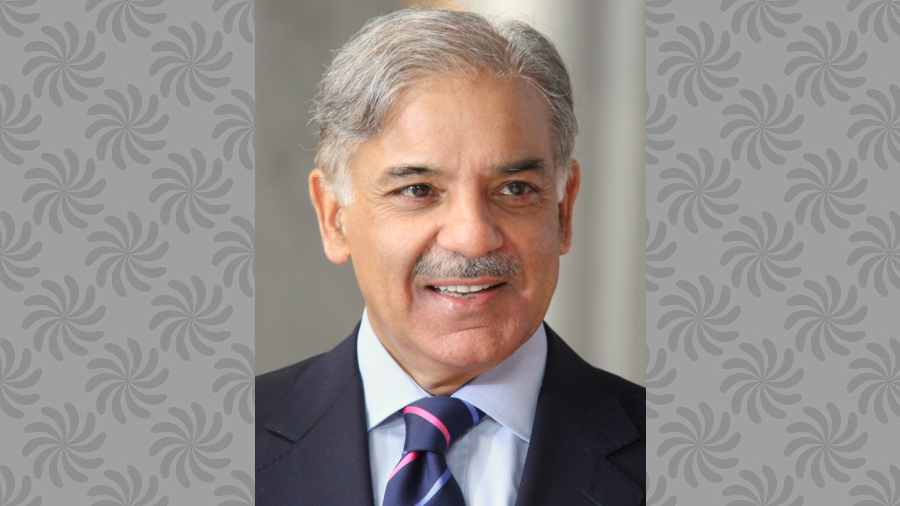Shehbaz Sharif was sworn-in as the new Prime Minister of Pakistan on Monday, bringing to an end the political uncertainty that had gripped the country since a no-confidence motion was introduced against his predecessor Imran Khan on March 8.
Senate Chairman Sadiq Sanjrani administered oath of office to 70-year-old Shehbaz in President Dr Arif Alvi's absence, who went on 'sick' leave ahead of the PML-N leader's inauguration.
Earlier, Pakistan Parliament elected unopposed Shehbaz who was the only candidate left in the race after former foreign minister Shah Mahmood Qureshi announced that his Pakistan Tehreek-e-Insaf party will boycott the voting and staged a walkout.
"Sharif has secured 174 votes and has been declared as prime minister of Islamic Republic of Pakistan," according to the formal result announced by Speaker Ayaz Sadiq who presided over the National Assembly session after Deputy Speaker Qasim Suri said his conscience did not allow him to conduct the session.
In the House of 342, the winning candidate should get support of at least 172 lawmakers.
"Sharif has secured 174 votes and has been declared as prime minister of Islamic Republic of Pakistan," according to the formal result announced by Speaker Ayaz Sadiq who presided over the session after Deputy Speaker Qasim Suri said his conscience did not allow him to conduct the session.
In the House of 342, the winning candidate should get support of at least 172 lawmakers.
In his maiden address to the house as the prime minister, Shehbaz said that it was the first time in Pakistan's history that a no-confidence motion against a prime minister had been successful. "And good has prevailed over evil," he said.
He said today is a "big day" for the entire nation as a "selected" prime minister has been sent home in a legal and constitutional manner.
Shehbaz, the younger brother of former three-time prime minister Nawaz Sharif, said that the US dollar's value declining by Rs 8 today signified the "happiness of the people".
He acknowledged the apex court's "unanimous" verdict, saying the day when the Supreme Court gave its judgment should be marked as a historic day in the history of Pakistan.
On the letter controversy, Shehbaz said the letter came on March 7, but decisions to bring a no-trust motion was made way before that.
"So, if (what the previous government claimed) is a lie, then the matter should be disclosed transparently before the public," he said.
He announced that the parliament's security committee would be given a briefing on the "threat letter" to the members of the committee in presence of the armed forces personnel and bureaucrats the Inter-Services Intelligence chief, foreign secretary, and the ambassador who wrote it.
"If there's an iota of evidence that we were backed by foreign conspirators ... then with you Mr speaker and God as my witness, I will not think for another second and resign from the office of the prime minister," Shehbaz said, vowing to hold an in-camera session of the security committee at the earliest.
He also lauded China for its support to Pakistan at the world stage and said the friendship between the two countries will remain intact.
He also thanked his brother and ex-premier Nawaz Sharif for his support.
The oath-taking ceremony will be held in the President House where President Arif Alvi would administer the oath of office to him later Monday.
Earlier, Qureshi in his address announced to boycott the process along with party lawmakers by announcing their mass resignation from the parliament. His decision was not sudden as the party had already announced it would leave the parliament and boycott the election to elect the new prime minister of the country.
The younger Sharif is known as an able administrator who served for years as chief minister of Punjab, the largest province of the country and greatly transformed the road infrastructure of the province.
The successful completion of the process to carry through the no-confidence motion and elect the new leader of the house has for the time being ended the political instability. But the resignation by PTI and its decision to launch protest rallies has seeds of a fresh round of chaos.
The new prime minister would have to face not only the unruly PTI taking to the streets but a brittle economy that needs a very careful handling. There are a lot of expectations of the masses from the new leadership to control inflation, which is a tough task.
Shehbaz's PML-N has only 86 seats and the rest of numerical support has come from the coalition partners who apparently has nothing in common except their rivalry for Khan, and it will be a big challenge for him to keep them calm and satisfied.
On the security front, there has been a revival of terrorist attacks in the country and the new prime minister would have to take quick measures to nip this evil in the bud.
Foreign policy challenges are also no less daunting, especially after the allegations of former prime minister Khan against the US in the context of conspiracy to remove him. Similarly, Pakistan's ties with India will also be a crucial test for the new leader of the country.
But Shehbaz's strength flows from various political parties - the former combined opposition that are behind him. His historical good ties with the establishment would also be an asset to deal with the multiple challenges.










